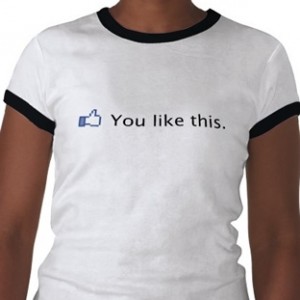Judge Says Facebook “Likes” Aren’t Protected By The First Amendment
It seems like these days social media makes up the bulk of our lives. Pretty much everyone has a Facebook or Twitter account and for many the medium is where most of their social interaction takes place. As such, it would make sense that your musings online should be afforded the same First Amendment free speech protections that in-person communications are given. Well, apparently they aren’t, at least when it comes to Facebook “likes” according to a Virginia U.S. District Court judge.
The decision just came down in a case called Bland v. Johnson, 2012 U.S. Dist. LEXIS 57530 (2012). The plaintiffs were sheriff employees who alleged they were wrongly fired by their boss after they “liked” the boss’ competitor. You see, the sheriff was up for reelection and after he caught wind of their Facebook activities, he was none too pleased. Allegedly, he was using his employees and even prisoners to help bolster his campaigning efforts.
Unfortunately for the plaintiffs, their boss won the election and allegedly cleaned house of all his naysayers, namely the plaintiffs who subsequently filed a lawsuit alleging, among other things, that canning them for their Facebook “likes” violated their First Amendment rights.
It’s an interesting case for sure, especially since the judge ruled in favor of the defendant. Apparently, the court decided that “merely ‘liking’ a Facebook page is insufficient speech to merit constitutional protection.” The court reasoned that unlike comments on social media pages, clicking links and buttons online weren’t tantamount to making an actual substantive statement.
While most people understand that the First Amendment protects free speech, the amendment actually covers more than just oral and written communications. It protects any conduct that can be construed as a statement. This means actions that are meant to convey a message or express one’s opinion cannot be censored by the government. That’s why cops can’t bust people for doing things like burning flags or protesting. The U.S. Supreme Court established this precedent a long time ago.
 That’s also why this ruling is so odd. The court in this case seems to draw the line of what is and isn’t a statement with Facebook likes for reasons that aren’t entirely clear. The court seems to believe that a click of a button doesn’t carry the same weight as say, slapping a political bumper sticker on your car or choosing who you hang out with.
That’s also why this ruling is so odd. The court in this case seems to draw the line of what is and isn’t a statement with Facebook likes for reasons that aren’t entirely clear. The court seems to believe that a click of a button doesn’t carry the same weight as say, slapping a political bumper sticker on your car or choosing who you hang out with.
But is “friending” or “liking” a person on Facebook really all that different? When you make a friend in real life, you’re exercising your right to free association under the constitution. So why then is doing essentially the same act online any different?
It’s not, or at least, it shouldn’t be considered different. Whether it’s adding someone to your friends list or giving a thumbs up to someone’s status, the act in and of itself is by its nature an expressive action meant to voice one’s opinion. A Facebook “like” is a statement and should be protected by the First Amendment. It doesn’t matter if the action is done online. People express themselves online through clicks all the time. We agree to contracts, posts our thoughts on topic both big and small. Adding a murky distinction to distinguish “likes” from free speech protected statements only needlessly confuses the law.
But what do you guys think? Should a Facebook “like” and/or social media interactions receive First Amendment protections? Was the judge right in this case?

Comments
I really fail to see the difference in clicking on a “like” versus the examples you used, burning the flag or a bumper sticker. Honestly, as a non-lawyer, I would have no idea what would be considered protected speech if the courts rule that I am permitted to burn, let’s say a candidate’s photo, but am not permitted to make that same statement in clicking on a “like” button. Would speech be protected if I made that same statement on facebook if I typed my views but it’s not protected if I agree with someone (via a like button) who typed on their page the views I hold?
I’m not really a huge FB user so this really doesn’t affect me much. By the same token, I haven never been arrested but I would not want to lose the right to an attorney even if I never have a need for a criminal defense attorney. I don’t like losing a means of free speech (like or dislike buttons) even if I don’t really use that media to express myself.
I guess us Americans should be careful in what we “like” or “dislike” as it is not protected speech.
The “like” was substantive enough statement to get them fired. It should follow that it was substantive enough to merit First Amendment protection.
Perhaps I’m “reading something into the Constitution”?